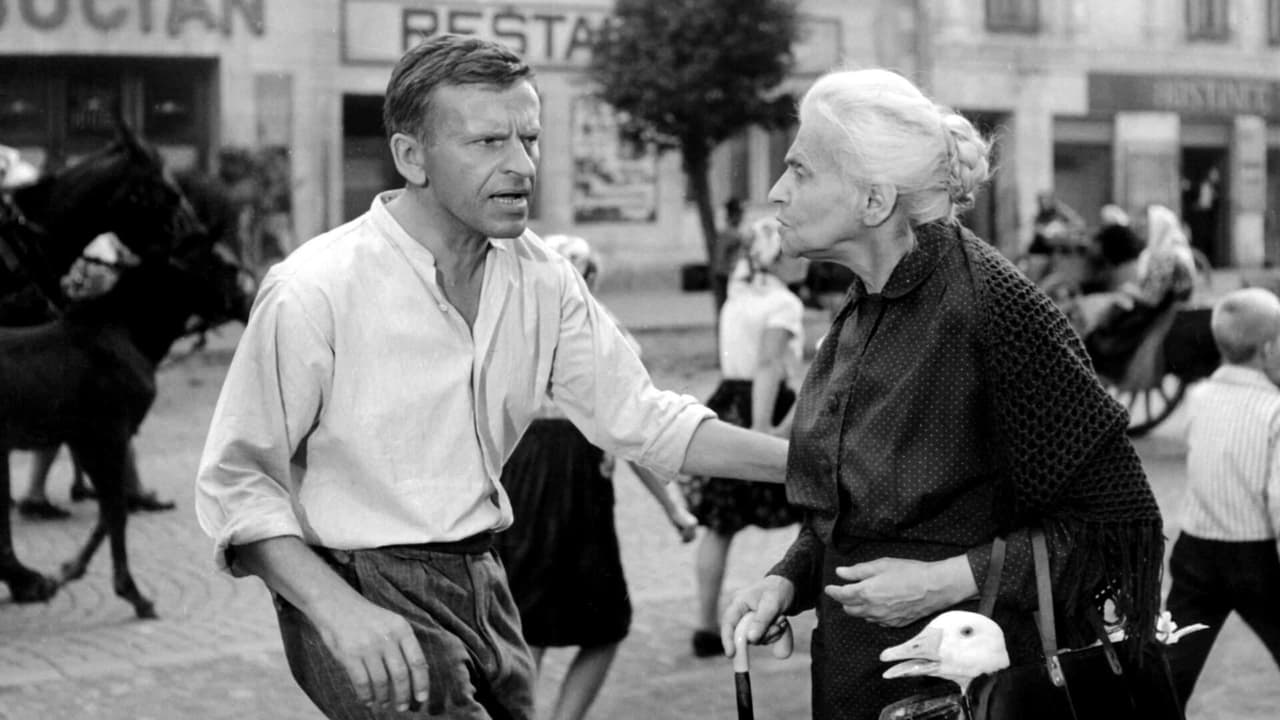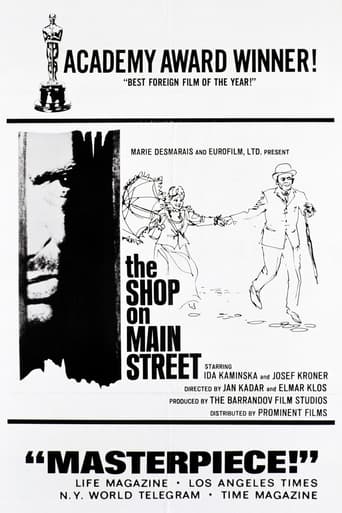

The Shop on Main Street (Czech/Slovak: Obchod na korze) (1965) Director: Ján Kadár and Elmar Klos Watched: May 29, 2018 Rating: 7/10 Loyal dog, kind friends, Greedy wife, quaint Slovak town. They were Tóno's World. Aryan owner, Naive Jewess shopkeeper, Unlikely friendship. Macro look at war, More profound and real Than frontline battles. Affecting acting, Camera as character, Well-timed reveries. Close call then fluke death felt cheap, Moral trap ends bittersweet. Haiku Sonnets are comprised of 4 3-line haiku plus a couplet of either 5 or 7 syllables, adding up to 14 lines, the same number of lines found in a sonnet. (5-7-5, 5-7-5, 5-7-5, 5-7-5, 7-7/5-5).
... View MoreThose who did not live in Europe during WWII tend to have questions about what really happened during those years of Nazi influence. How can a society allow the atrocities to happen? How much did the citizenry know of the death camps and the atrocities? What psychology was at work that would allow someone like Hitler to ascend to power?Although we may not receive answers to all our questions in one film, "The Shop on Main Street" is one of a number of films that help explain. The shop in question is owned by an older Jewish lady. It is situated in a small town that is nothing special. Use of the term "Main Street" lets us know that this is supposed to be a typical street, a representative street.The story takes place during the time that nationalism and anti-Semitism are becoming synonymous in the region. Opinions that might have existed for many years are now able to be voiced in the mainstream and have even become the voice of the government.Much of the film is viewed from the perspective of Tony Brtko, a gentile who has been given the opportunity to assist the elderly shop owner. He is a simple man--one who, perhaps, would rather not contemplate questions of political philosophy or confront questions of allegiance. But such is his lot when the authorities begin to round up the town's Jews.Through the windows of the shop, which is located right on the town square, he is able to view the "outside" world as it changes before his eyes. Questions of morality are thrust upon him.The single aspect of this film that I like the most is the director's use of the camera. It gives us a POV, it moves through a window and gives us both the inside and outside views of happenings, it lingers on objects, giving them importance and making them the focus of tension, allowing us to consider what we have seen before the story continues. It wanders sometimes, seemingly making an inventory of the surroundings, perhaps following Tony's eyes as he considers his options as his options become fewer and fewer. Like most good films, it allows the camera to show us rather than have the dialogue explain to us. Note how it sometimes follows the dog going on with his "doggy life"*.This is an excellent film. Its ending is a little ambiguous, allowing the viewer to make his own interpretation or to ask questions of himself. It is worth seeing twice.*reference to Musee des Beaux Arts, by W. H. Auden.
... View MoreWith "The Shop on Main Street", director Jan Kadar takes us to 1940s Slovakia. Set in a small rural town during the deportation of Jews to Nazi concentration camps, the film revolves around Tono, a kind hearted carpenter.Tono spends his days playing with his dog and being pestered by the husband of his wife's sister, the local Fascist leader. Like most people in his village, Tono doesn't like the Fascists, but also doesn't do much to oppose them. He's timid, and like many rural persons during the era, doesn't quite understand what's going on around him anyway.When the Fascists begin turning Jews over to the Nazis, one Jewish shop, which sells buttons and trinkets, is left without an owner. Tono's Fascist brother-in-law thus gives the shop to Tono and appoints him "Aryan Overseer". Tono and his wife imagine that this will make them wealthy, but it turns out that the shop is still inhabited by its senile owner, an elderly Jewish lady called Mrs. Lautmann, who is poor and cannot make a living from her business.What's funny is that the Jewish lady is as confused as Tono is. She thinks he has come to her shop to act as an assistant, whilst he has no idea how to run a shop, let alone any inkling of the genocidal horrors blossoming all around him.Eventually Tono and Mrs Lautmann grow to be friends. He becomes a kind of duplicitous character, simultaneously working for the Fascists in their effort to remove Jews from the town, and for the Jewish community, which pays him to take care of the feeble Mrs. Lautmann. This scheming comes to an end however, when the Fascists finally order the deportation of all Jews, leaving Toto torn (ala another Holocaust movie, "Sophie's Choice" or even the dark kid's movie, "Battle for Terra") between three impulses: save Mrs Lautmann, save himself and his family, and a kind of fatalistic, feeling of absolute indifference.In one great sequence, Tono seems to hold all these feelings simultaneously. In a drunken stupor he fluctuates wildly from one position to the next, pushing the bewildered Mrs. Lautmann out into the streets, then locking her in a cupboard, then yanking her out again, unsure whether to sell out this little Jewish lady, and his soul in the process. The film's ultimate point, though, is that for all his heart, Tono can do nothing to derail history. History is a giant machine that rolls somewhere out beyond the grasp of men, comprehensible only in hindsight. The film ends, shockingly, with Tono's suicide and the death of Mrs Lautmann. We're then shown a nostalgic fantasy – which, in a way, satirises the end of "Schindler's List" decades before Spielberg's film was even made – in which Tono and Mrs. Lautmann, dressed in the finery of a pre-Fascist age, stroll merrily together through the streets, the hazy lighting indicating that such an ending is entirely wishful and counter-factual. Cinematic depictions of the Holocaust are problematic for two logically opposed, yet both entirely cogent, reasons. On the one hand, the horror of the event is banalized by any effort to represent it, making it proportional to all other events. Films like Claude Lanzmann's "Shoah", Lumet's "Pawnbroker", and in a way Mamet's "Homicide" and Kubrick's "Shining", are films that direct our attention to the unrepresentability of the Holocaust as its subject matter. On the other hand, and at the same time, the Holocaust gets thrown about as a token of high seriousness and good faith, and as a weapon to silence other concerns and other discourses (think the Ricky Gervais comedy sketch where Kate Winslet effortlessly wins Oscars through Holocaust films, or Jerry Lewis' Oscar bait, "The Day The Clown Cried"). Holocaust films win Oscars precisely because the subject matter itself is used to deflect any questions about aesthetic value and artistic integrity. "Schindler's List" exhibits both of these tendencies simultaneously. At the same time that "Schindler's List" relentlessly and aggressively banalizes the Holocaust — few set pieces are as condemned, by artists, directors and writers, as Schindler's List's shower sequence — the film also claims a moral authority from its subject matter that preempts all criticism in advance.So in a way, Kadar's film presents the anti-Schindler, shattering Spielberg's redemptive fable (Rivette: "Turning the Holocaust into a redemptive allegory is an offence without reprieve."). Tono's intentions cannot buffer the monstrous forces of Fascism and Nazism, let alone Stalinism, Maoism, American Slavery or the many other horrors of the last several hundred years. "The Shop on Main Street" reminds us — and this is a reminder that Americans need more than Europeans — that a good conscience, and a basic human decency, are not enough to save us.This is not defeatism or the admittance of a kind of individual, self-reflexive impotency, but rather a call for organisation. One man saving 1,100 Jews whilst the pointless, industrialised murder of six million occurs elsewhere, does not prove that people are "good" and "can make a difference". It proves people are brutes and that it often takes more than a molehill to stop a mountain. Human beings do indeed "make their own history", but, as Marx went on to say, "they do not make it just as they please." 8/10 – See David Mamet's "Homicide" and Marek Najbrt's "Protector".
... View MoreI have seen this movie at 2005 World Film's festival in Thailand on last October. I have to admit that the title of this movie was out of my interest at first. Moreover, I hadn't known anything about this movie so far.After having finished seeing Obchod na korze, I got by far more than I bargained for. The movie itself is really touching and moving, especially masterful in its plot of depicting grass-root citizens under the influence of Nazism control. Ida Kaminska is also fantastic and superb in portraying her role as Rozalie Lautmann. She was nominated Best Actress in leading role for Oscar that year, but failed to get Oscar's nod. I quite wonder why, among other nominees. Most importantly, the last scene that Ida Kaminska holding an umbrella while her other hand holding Jozef Króner's hand, walking down together on the street is totally excellent. It is one of the best ending scenes and one of best Holocaust films I have seen in my life.Undoubtedly, I give it 10.
... View More